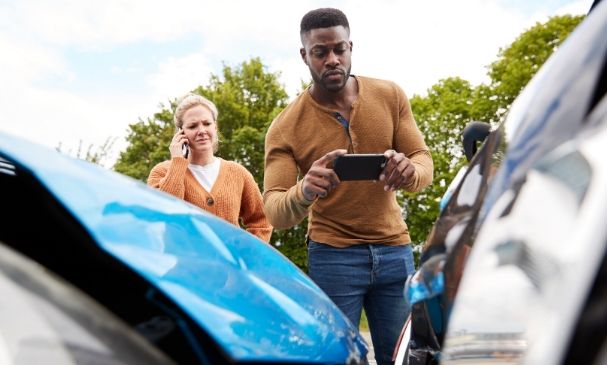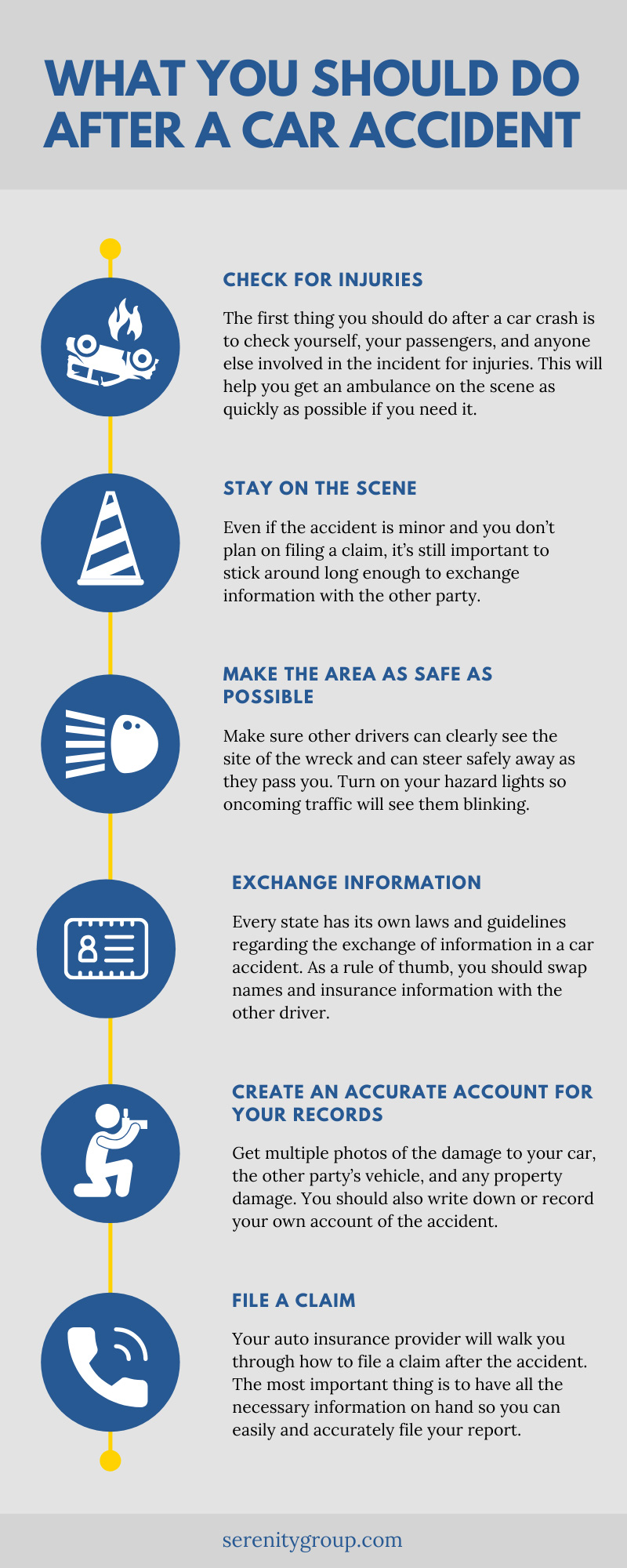What You Should Do After a Car Accident

Accidents happen. Car crashes are a fairly common experience for drivers, and most of them only involve property damage without any injuries. Yet no matter how common or minor these accidents may be, it’s still easy to feel shaken, adrenalized, or otherwise distracted if you get into a wreck on the road. Despite these feelings, it’s important to stay calm after an accident so you can do everything you need to take care of yourself, your passengers, and your auto insurance. Make the most of a bad situation by following this guide on what you should do after a car accident.
Check for Injuries
Your health and safety are a priority. The first thing you should do after a car crash is to check yourself, your passengers, and anyone else involved in the incident for injuries. This will help you get an ambulance on the scene as quickly as possible if you need it. Do your best to stay calm, especially if you or a passenger is injured. Make sure you give clear, helpful details to the operator when you call 911. Even if the injuries are minor or seemingly harmless, it’s still a good idea to call 911. This way, if an injury turns out to be a bigger deal down the road, you have an official record of the event to file with your insurance company.
Stay on the Scene
One of the biggest mistakes people make is leaving the scene of a car crash. Even if the accident is minor and you don’t plan on filing a claim, it’s still important to stick around long enough to exchange information with the other party. You never know what lasting damage or issues might come up. Even if your car looks fine, there might be internal damage that will take a while for you to identify. The same goes for any minor bruises or injuries you might have. The jolt from a car rear-ending yours can end up causing back pain down the road. It’s always better to be safe than sorry, so make sure you go through all the steps for every accident, no matter how small or insignificant it seems.
Make the Area as Safe as Possible
Once everyone involved is safe, the next step is to prevent further accidents. Make sure other drivers can clearly see the site of the wreck and can steer safely away as they pass you. Turn on your hazard lights so oncoming traffic will see them blinking. This is particularly important when it’s dark outside. If your lights don’t work after the accident, use a flashlight or your phone as a beacon to alert other drivers that something is happening on the side of the road. This will signal them to proceed cautiously as they pass the accident. If your car is in the way of traffic, try to move it off the road. However, you want to try to keep the scene as intact as possible until police or other officials arrive. If you aren’t interfering with traffic, leave your vehicles where they are so the police can get an accurate view of the crash site.
Exchange Information
You and the other passengers are safe, traffic is continuing to flow without bothering you, and now it’s time to exchange information with the other driver. This step is crucial to your insurance and any claims you or the other driver might file. Every state has its own laws and guidelines regarding the exchange of information in a car accident. As a rule of thumb, you should swap names and insurance information with the other driver. Contact information can also be useful if you’re both willing to provide it. Write this information down and double-check it with the other driver to make sure both of you have accurate records. It’s also important during this process to never admit guilt or blame for the accident. Even if you feel like it was your fault, admitting this can cause you a lot of legal and financial complications once you and the other driver file claims. As a precaution, avoid talking about the details of the accident with anyone who isn’t the police, medical professionals, or your insurance company.
Create an Accurate Account for Your Records
As you exchange information with the other driver, make sure you write down as many details as possible for your records. Don’t trust that you’ll remember it later. The better your records are, the more accurate your insurance claim will be. This will make the entire process easier after your accident. As you’re gathering this information, it’s also a good idea to take pictures of the accident. Get multiple photos of the damage to your car, the other party’s vehicle, and any property damage. Photograph any visible injuries as well. You should also write down or record your own account of the accident. The earlier you can do this, the more accurate your memory will be. Write it down in your phone or record an audio file of yourself discussing the accident. The details you write down initially will go a long way toward helping you throughout the insurance and claims process.
File a Claim
Your auto insurance provider will walk you through how to file a claim after the accident. The most important thing is to have all the necessary information on hand so you can easily and accurately file your report. If you’re unsure about what details you need, don’t be afraid to contact your insurance provider while you’re still on the scene. However, it always pays to be prepared. Read up on your auto insurance provider’s policies regarding accidents, fault, and claims. The more you understand about your insurance coverage and policy, the easier it’ll be to manage this information after a car accident.
A lot of information and details fly around after an accident, and it can be hard to keep track of all of it. The most important thing is to stay calm and seek help where you can. If you were in an at-fault accident or were driving uninsured at the time of your crash, you might need SR22 insurance to reobtain your license and get back on the road. Though this is an added step to what you should do after a car accident, it doesn’t have to be difficult. Serenity Group is here to help. If you need SR22 insurance in Washington, California, or any other of our service areas, we’ll help you find the insurance policy and provider that work best for you after your crash.


Recent Comments